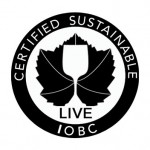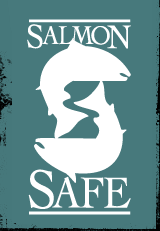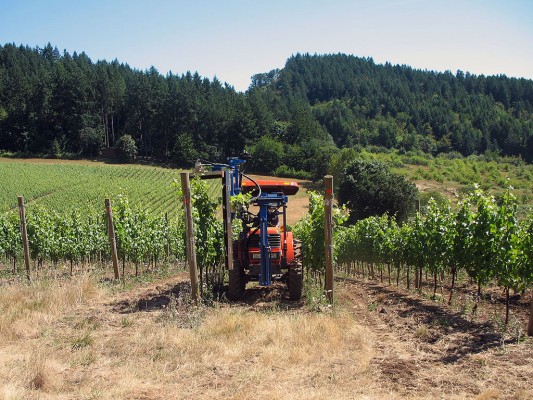Environmentally Responsible
The CBV is dedicated to the production of ultra-premium winegrapes – pinot noir, chardonnay, and pinot gris – by the highest standards of sustainable farming.
- Our fungicide program is a sustainable farming program consistent with our LIVE certification
- In a well-balanced ecosystem, sprays for insects should not be necessary. Excessive or wrong sprays for fungicides can unbalance this system, including the balance of beneficial and deleterious insects. CBV strives in its spray program to maintain that balance by rotating sprays and using a little as necessary to get the job done. Our vineyard weather monitoring system is a powerful tool in assuring that sprays are applied only when indicated. We do use pheromone trapping of yellow jackets to protect our workers at harvest time.
- No poisonous vertebrate pesticides are used at CBV. Gophers are trapped and birds are scared away by electronic distress sounds or, when absolutely necessary, sonic booms from propane cannons.
- Weeds in the vine rows and alleyways are controlled primarily by cultivation.
- The CBV commitment to sustainable viticulture was recognized by LIVE at its 2013 annual meeting by the LIVE 2013 “Award of Excellence in Sustainability.”
- Supported by the award of two grants from the USDA’s Natural Resource Conservation Service, the CBV has launched an “upland oak woodland” restoration project. Ten acres of land on the slopes above the vineyard are being restored by the removal of invasive and non-native species, expanding and enhancing the habitat for native plants, birds, and insects.
Growing The Finest Grapes, Naturally
Our vineyard is certified by LIVE (Low Input Viticulture and Enology, Inc.) and Salmon Safe. Our sustainable farming efforts have been recognized by the USDA through its Conservation Security Program (CSP). Of the 104 farms in the Yamhill River Basin admitted to the program, 32 were recognized as having the highest level of stewardship as defined by the CSP, and our farm was the first vineyard admitted among those 32 farms. Among the CBV practices are use of biodiesel fuel in our tractors, a program to restore native species, limited mowing of pasturelands to promote ecological diversity, and use of only those chemicals meeting sustainable farming standards.
Consistent with the theme of low input farming, we use as few external chemicals as possible, but when necessary, we use only those whose specificity and half-life in the environment are approved for use in sustainable farming. This philosophy applies to pest control (for both fungal as well as insect and vertebrate pests) and weed control.
Biological Feedback – Natural Fertilization
Through chemical analyses of the soil and plant tissues, the chemical balance of the vineyard is monitored. Fertilization is provided by the winter planting of winter cover crop that includes nitrogen-fixing legumes. The cover crop provides efficient erosion control in the winter rains. When that cover crop is plowed under in the spring, valuable organic matter and nutrients are added to the soil.
Renewable Energy
Crawford Beck Vineyard is focused on minimizing its carbon footprint. Power for the CBV is provided by a 17.28 kW photovoltaic solar array installed by Sunergy Systems in a net-metering arrangement with Portland General Electric. This project was partially funded by a renewable system energy grant awarded by the Rural Development Program of the United States Department of Agriculture. While a certain amount of tractor traffic is unavoidably necessary, it is minimized, both to minimize fuel but also to minimize compaction of the vineyard soils. All CBV tractors are run on biodiesel fuel.



